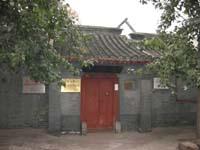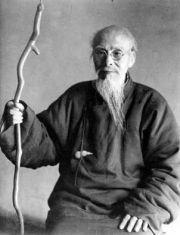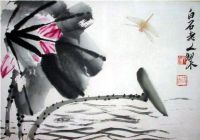Difference between revisions of "Former Residence of Qi Baishi"
imported>Ciic |
imported>Ciic |
||
| (One intermediate revision by the same user not shown) | |||
| Line 10: | Line 10: | ||
Qi Baishi, of [[Hunan Province]], had traveled around the country on his earlier years, selling paintings and carving seals to make a living. | Qi Baishi, of [[Hunan Province]], had traveled around the country on his earlier years, selling paintings and carving seals to make a living. | ||
| + | [[File:Lotus and Dragonfly, Asian Antiquities-.jpg|thumb|200px|Lotus and Dragonfly by Qi Baishi]] | ||
He settled down in [[Beijing]] at the age of 57, and gradually his style of painting began to change. Combining traditional freehand brushwork and folk art, he produced a unique art form centering on flowers, birds, insects, and fish. Simple and bold, each colorful painting was achieved with only a few strokes. In his later years he focused on calligraphy and seal carving and served in the early 1950s as chairman of the Chinese Artists' Association. | He settled down in [[Beijing]] at the age of 57, and gradually his style of painting began to change. Combining traditional freehand brushwork and folk art, he produced a unique art form centering on flowers, birds, insects, and fish. Simple and bold, each colorful painting was achieved with only a few strokes. In his later years he focused on calligraphy and seal carving and served in the early 1950s as chairman of the Chinese Artists' Association. | ||
| − | |||
[[Category:Museums in Beijing]] | [[Category:Museums in Beijing]] | ||
Latest revision as of 03:01, 1 December 2014
The Former Residence of Qi Baishi (1863-1957), a well-known Chinese artist, is located near the western entrance of Picai Lane in the West City District. Artists and VIPs from all over the world converged at Qi Baishi' s home in the seven or eight years before his death in1957. Though the government had given him another house on the east side, he preferred his own garden, full of the more mundane crops, such as towel-gourd, peanuts, pumpkins, grapes and morning glory. His famous works "Towel-Gourd and a Bee," "Grapes and a Dragonfly," are all taken from the yard on Picai Lane.
Qi Baishi's son Qi Liangzhi remembers the following:
There was a time, when the Chinese Artists' Association was in a generous mood, that they arranged a quiet, comfortable environment for my father in Yu'er Lane of the East City District. Tastefully designed with red corridors, flowering crabapples, and rockeries, it really was like a small park. But he missed his own home, the trees and flowers he had planted himself, and requested to move back. Premier Zhou gave his assent and even accompanied him home, staying awhile to chat with the family.
Qi Baishi, of Hunan Province, had traveled around the country on his earlier years, selling paintings and carving seals to make a living.
He settled down in Beijing at the age of 57, and gradually his style of painting began to change. Combining traditional freehand brushwork and folk art, he produced a unique art form centering on flowers, birds, insects, and fish. Simple and bold, each colorful painting was achieved with only a few strokes. In his later years he focused on calligraphy and seal carving and served in the early 1950s as chairman of the Chinese Artists' Association.


